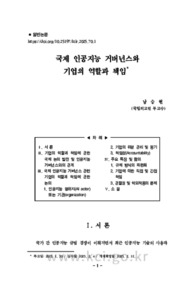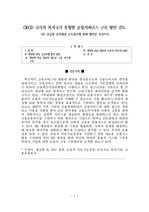

-
미리보기
서지정보
· 발행기관 : 국제법평론회
· 수록지 정보 : 국제법평론 / 70호 / 1 ~ 20페이지
· 저자명 : 남승현
초록
With increasing competition among states to take part in the formation of international governance for artificial intelligence, more discussions are taking place on role and responsibility of corporations considering their role in developing, using and managing the personal data of individuals for artificial intelligence. Discussions on the responsibility of corporations already began to take place in the early 2000s in the international platform, which led to the adoption of the UN Global Compact, OECD Guidelines on Multinational Enterprises, and the UN Guiding Principles on Business and Human Rights, emphasizing the human rights responsibilities of corporations. In order to implement these Guiding Principles, more than 30 countries today have adopted their own National Action Plans within their own countries. And the UN Office of the High Commissioner is now reviewing a draft on regulation of multinational enterprises to stregnthen these regulations. While many of these instruments focused on the role of the state duty to protect, new instruments on international governance for artificial intelligence are now beginning to focus more directly on regulating the corporation itself. For example, the UNESCO Recommendation on the Ethics of Artificial Intelligence and the OECD AI Principles provide guidelines for not only states but also artificial intelligence actors and organizations, which include corporations. The G7 Hiroshima process on Artificial Intelligence which led to the adoption of its own Guiding Principles and Code of Conduct that was largely led by Japan also provides risk management approaches for corporations. On the other hand, the Council of Europe Framework Convention on Artificial Intelligence does not directly regulate corporations, but it does impose certain indirect responsibilities on corporations through the state. As such, there is increasing emphasis on the role of corporations in the development of international governance of artificial intelligence and this paper aims to highlight the recent developments as well as the key issues addressed by the relevant stakeholders.영어초록
With increasing competition among states to take part in the formation of international governance for artificial intelligence, more discussions are taking place on role and responsibility of corporations considering their role in developing, using and managing the personal data of individuals for artificial intelligence. Discussions on the responsibility of corporations already began to take place in the early 2000s in the international platform, which led to the adoption of the UN Global Compact, OECD Guidelines on Multinational Enterprises, and the UN Guiding Principles on Business and Human Rights, emphasizing the human rights responsibilities of corporations. In order to implement these Guiding Principles, more than 30 countries today have adopted their own National Action Plans within their own countries. And the UN Office of the High Commissioner is now reviewing a draft on regulation of multinational enterprises to stregnthen these regulations. While many of these instruments focused on the role of the state duty to protect, new instruments on international governance for artificial intelligence are now beginning to focus more directly on regulating the corporation itself. For example, the UNESCO Recommendation on the Ethics of Artificial Intelligence and the OECD AI Principles provide guidelines for not only states but also artificial intelligence actors and organizations, which include corporations. The G7 Hiroshima process on Artificial Intelligence which led to the adoption of its own Guiding Principles and Code of Conduct that was largely led by Japan also provides risk management approaches for corporations. On the other hand, the Council of Europe Framework Convention on Artificial Intelligence does not directly regulate corporations, but it does impose certain indirect responsibilities on corporations through the state. As such, there is increasing emphasis on the role of corporations in the development of international governance of artificial intelligence and this paper aims to highlight the recent developments as well as the key issues addressed by the relevant stakeholders.참고자료
· 없음태그
-
자주묻는질문의 답변을 확인해 주세요

꼭 알아주세요
-
자료의 정보 및 내용의 진실성에 대하여 해피캠퍼스는 보증하지 않으며, 해당 정보 및 게시물 저작권과 기타 법적 책임은 자료 등록자에게 있습니다.
자료 및 게시물 내용의 불법적 이용, 무단 전재∙배포는 금지되어 있습니다.
저작권침해, 명예훼손 등 분쟁 요소 발견 시 고객센터의 저작권침해 신고센터를 이용해 주시기 바랍니다. -
해피캠퍼스는 구매자와 판매자 모두가 만족하는 서비스가 되도록 노력하고 있으며, 아래의 4가지 자료환불 조건을 꼭 확인해주시기 바랍니다.
파일오류 중복자료 저작권 없음 설명과 실제 내용 불일치 파일의 다운로드가 제대로 되지 않거나 파일형식에 맞는 프로그램으로 정상 작동하지 않는 경우 다른 자료와 70% 이상 내용이 일치하는 경우 (중복임을 확인할 수 있는 근거 필요함) 인터넷의 다른 사이트, 연구기관, 학교, 서적 등의 자료를 도용한 경우 자료의 설명과 실제 자료의 내용이 일치하지 않는 경우
찾으시던 자료가 아닌가요?
지금 보는 자료와 연관되어 있어요!
문서 초안을 생성해주는 EasyAI



